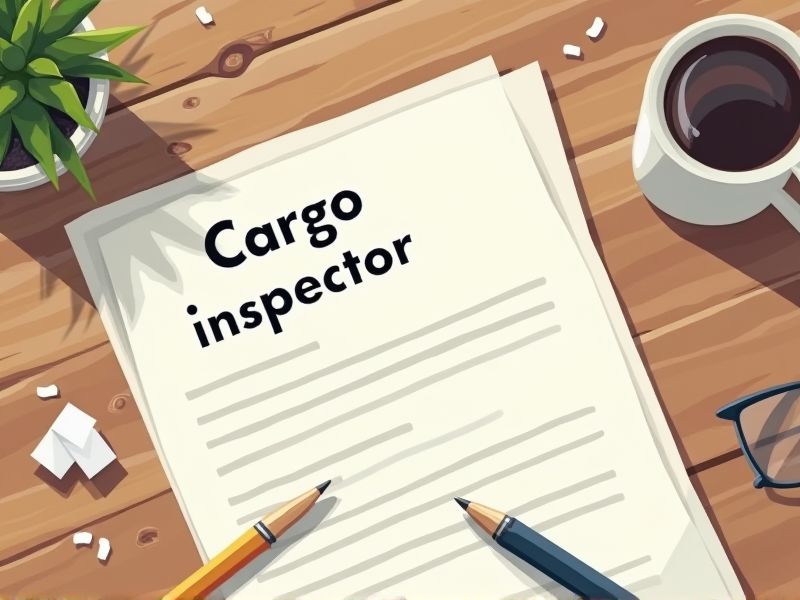
Cargo inspectors are responsible for ensuring that goods comply with transportation regulations and safety standards. Certification validates an inspector's knowledge of cargo handling procedures, risk assessment, and regulatory compliance. It also equips them with the skills to identify hazardous materials and prevent potential security breaches. Key certifications enhance these abilities, making them essential credentials for cargo inspectors.
IATA Dangerous Goods Regulations (DGR) Certification
The IATA Dangerous Goods Regulations (DGR) Certification is essential for a cargo inspector as it ensures a comprehensive understanding of the international standards for transporting hazardous materials by air. Without this certification, inspectors may lack the requisite knowledge to identify and manage dangerous goods, potentially leading to safety risks. This certification provides inspectors with the skills to classify, label, and document hazardous cargo correctly, reducing errors and legal liabilities. Airlines and regulatory bodies require this certification to maintain compliance and uphold the highest safety standards in cargo handling.
International Maritime Dangerous Goods (IMDG) Code Certification
Cargo inspectors require International Maritime Dangerous Goods (IMDG) Code Certification to understand and implement the legal requirements essential for safely transporting hazardous materials by sea. This certification ensures inspectors can identify, classify, and adequately document dangerous goods, preventing accidents and environmental harm. Without this specialized knowledge, inspectors may overlook critical safety protocols leading to potential safety breaches and legal liabilities. Companies and port authorities require inspectors to possess this certification to maintain compliance with international safety standards and regulations.
HAZMAT Awareness Certification
HAZMAT Awareness Certification is needed for cargo inspectors because it equips them with knowledge to identify hazardous materials correctly. This awareness helps in preventing accidents and ensuring compliance with safety regulations during cargo handling. Without such certification, inspectors might overlook potential risks, leading to dangerous exposures or spills. Effective hazard identification improves overall operational safety and reduces liability for companies involved in cargo transportation.
Transportation Worker Identification Credential (TWIC)
Cargo inspectors require the Transportation Worker Identification Credential (TWIC) due to heightened security protocols in maritime environments post 9/11. This credential ensures only vetted individuals can access secure areas of ports and vessels, reducing potential threats. The presence of a TWIC fosters a standardized security measure across U.S. ports, enhancing safety and operational efficiency. Cargo inspectors with TWIC credentials streamline the inspection process, facilitating timely and secure cargo handling.
U.S. Customs Broker License
A U.S. Customs Broker License is essential for a cargo inspector to legally facilitate the entry of goods into the country, ensuring compliance with federal regulations. This license equips the inspector with the necessary legal authority to submit required documentation, which is critical for avoiding costly fines and potential cargo hold-ups. Understanding complex tariff classifications and duty rates becomes manageable with the expertise gained through the license. With licensed knowledge, cargo inspectors can accurately assess, report, and resolve potential issues, enhancing efficiency in the supply chain process.
OSHA 30-Hour Safety Certification
Cargo inspectors face various hazards such as exposure to harmful substances and heavy machinery-related risks, which require comprehensive safety knowledge. The OSHA 30-Hour Safety Certification equips inspectors with crucial safety skills, significantly reducing workplace accidents. It also ensures inspectors are well-versed in regulatory compliance, minimizing legal and financial liabilities for companies. By enhancing the overall safety culture, certified inspectors contribute to a safer and more efficient work environment.
Certified Cargo Inspector Certification
Cargo inspectors are responsible for ensuring the safety and compliance of shipments, which requires a deep understanding of various regulations and standards. Certified Cargo Inspector Certification provides the necessary training and knowledge to accurately assess cargo and identify potential hazards. With certification, inspectors gain credibility and trust with employers and clients, enhancing industry standards. Certification also ensures inspectors stay updated with evolving regulations and technologies, reducing the risk of errors and liabilities.
Certified Transportation Professional (CTP) Certification
Obtaining the Certified Transportation Professional (CTP) Certification elevates a cargo inspector's understanding of transportation logistics, enhancing operational efficiency. The certification provides comprehensive knowledge on current industry regulations, ensuring compliance and reducing legal risks. CTP holders bring improved risk management skills, which contribute to minimizing cargo damage during transit. Certified professionals often command higher trust and credibility, potentially leading to better career advancement opportunities.
Certified Supply Chain Professional (CSCP) Certification
The CSCP certification equips cargo inspectors with comprehensive knowledge of global supply chain management, enhancing their ability to efficiently assess and mitigate risks. Mastery of supply chain principles through certification ensures more accurate inspection of goods, leading to improved compliance with international regulations. Enhanced understanding of logistics and supply chain dynamics enables cargo inspectors to optimize operational processes, reducing delays and costs. Certification distinguishes inspectors as professionals committed to industry standards, instilling confidence in employers and stakeholders.
International Dangerous Goods Safety Advisor (DGSA) Certification
The DGSA Certification ensures that cargo inspectors maintain a thorough understanding of the regulations governing the safe transportation of dangerous goods. This certification reduces the risk of accidents and environmental hazards due to mishandling or mismanagement of dangerous goods. Cargo inspectors with this credential are equipped to identify and rectify compliance issues, thus mitigating potential legal consequences for their employers. A firm grasp of international standards through DGSA Certification enhances the credibility and trustworthiness of cargo inspection services in the global supply chain.
Summary
When you obtain certifications as a cargo inspector, you enhance your professional qualifications, making you more attractive to employers and potentially increasing job opportunities. Certified inspectors often experience improved skills and knowledge, enabling more accurate and efficient cargo assessments. Employers may also trust certified inspectors with more significant responsibilities and tasks, reflecting confidence in their expertise. Overall, certification can lead to career advancement and better compensation in the cargo inspection industry.
